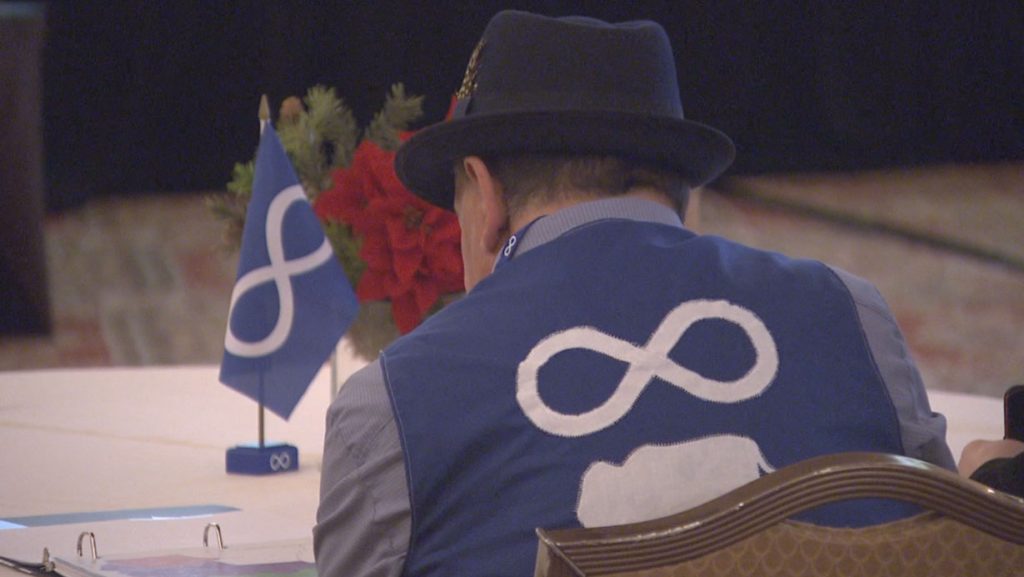
The infinity symbol represents the immortality of the Metis nation. Photo: APTN file
The committee process for a testy piece of legislation that would recognize Métis governments in three provinces has been extended until at least February.
House of Commons committee hearings about Bill C-53 have seen 65 witnesses testify and 274 briefs submitted that argue vigorously either for or against the legislation.
Some First Nations groups are also opposed to the bill, which would recognize Métis governments in Ontario, Alberta and Saskatchewan, urging MPs to vote against it because they say it could erode their own rights.
But it has support from the bodies that would be the direct beneficiaries of the bill and wider groups including the Métis National Council.
Members of Parliament have most recently been arguing over the finer points of the bill during meetings devoted to clause-by-clause deliberation – seven of them so far, featuring hours of debate.
That process is set to resume after the House returns from a winter break at the end of the month.
Sticking point
One sticking point has been whether the bill should use the term “Indigenous governing body” in reference to the recognition that organizations would be authorized to act on behalf of Métis, and that this affirms their inherent right to self-government as affirmed by the Constitution.
The term is included in the original wording of the legislation but is not defined. It has been used and specifically defined in other bills governing child welfare and a new national council for reconciliation.
Métis groups covered under the legislation said that failing to include the term would water down the intent of the bill and its benefits.
But some politicians, including Conservative and NDP MPs, expressed worries that its inclusion could affect other Métis groups in the same provinces that may not want to be governed by the bodies included in the legislation.
Métis Nation of Ontario president Margaret Froh says Métis people have been fighting for their rights for generations, and the passage of the bill would help recognize that.
Delays
But the delays have been “disheartening,” she said in a recent interview.
“Our leaders have fought and died for recognition of Métis self-determination, and we’re finally in a place now where we have the opportunity to move forward.”
The Métis National Council unanimously passed a resolution last month calling on politicians to pass the legislation without delay.
The scale of the committee study is “unprecedented” and “sets a new, negative standard for all future Indigenous self-government legislation to be subjected to,” said the resolution that Froh brought forward.
“The legislative process being dragged out has resulted in the amplification of toxic falsehoods, misinformation and painful lateral violence that has negatively impacted Métis youth and Elders.”
Raised concerns
First Nations leaders, especially in Ontario, have raised concerns at the committee and in public statements about what they see as the consequences of the bill’s passage.
The Chiefs of Ontario, an organization that represents about 130 First Nations in that province, has stressed that chiefs are worried about the Métis Nation of Ontario’s inclusion in the legislation.
Their concerns are mainly focused on six new communities the Métis Nation of Ontario and the province recognized in 2017, which they say have no historical basis to exist.
At a committee hearing in November, a high-ranking federal official testified that Ottawa has not verified the legitimacy of the disputed Métis communities or the wider memberships of the provincial organization, explaining that the government isn’t required to do so.
“They aren’t doing their homework to make sure that they are hearing from the right people,” NDP MP Lori Idlout (Nunavut) said shortly after.
“And I can understand why First Nations in Ontario would be greatly concerned about what’s going on.”









